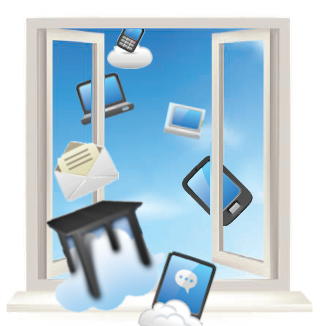 Is your business using mobile or “smart” devices (i.e. iPhone, Android Phone, Tablets, and/or notebooks) and experiencing as much productivity from them as desktop computers? Are any of your employees using their personal devices for professional use? Or, do you allow your employees to use company-issued devices outside of work and/or for personal use? Like most companies, the use of both employee-owned and company-owned mobile devices (i.e. smart phones, notebooks, and tablets) is driving demand for round-the-clock access to company tools and data. Executives, business managers, and other employees already use mobile devices to browse the web, send/receive email, and to conduct other personal activities, and with that, they also desire access to sales reports, inventory data, customer information, and other data from the same devices. However, most companies offer little or no support for this type of access and there are numerous productivity gains being missed out on as a result.
Is your business using mobile or “smart” devices (i.e. iPhone, Android Phone, Tablets, and/or notebooks) and experiencing as much productivity from them as desktop computers? Are any of your employees using their personal devices for professional use? Or, do you allow your employees to use company-issued devices outside of work and/or for personal use? Like most companies, the use of both employee-owned and company-owned mobile devices (i.e. smart phones, notebooks, and tablets) is driving demand for round-the-clock access to company tools and data. Executives, business managers, and other employees already use mobile devices to browse the web, send/receive email, and to conduct other personal activities, and with that, they also desire access to sales reports, inventory data, customer information, and other data from the same devices. However, most companies offer little or no support for this type of access and there are numerous productivity gains being missed out on as a result.
Why is this? While we are seeing these devices just about every day and everywhere, it seems that many small business owners still have some resistance to allowing their employees to use personal devices in the business environment. Let me clarify that a bit; most small business owners understand the benefits of having employees empowered with mobile access to work. However, I believe the issue is often when employees use personal devices for business use (and vice-versa). In my opinion, it just requires a new way of thinking. With so many applications being in “the cloud” today, mobile devices really shouldn’t be looked at as exclusive-to-location or exclusive-to-use devices. In simple terms, it’s really pointless to have an employee with two smartphones or two tablets (one for work and one for personal use). Really, mobile devices are simply just a tool – an extension of the person – that allows them to do what they need for business and personal life on one device regardless of where they are, so long as they have internet access.
Like anything, there are pros and cons to “deskless” technology, which I have outlined below:
- Productivity – how much more productive will your employees be by having a business-access device outside of work? On the flipside, how much productivity could be lost by having a device with applications that they use for personal reasons and entertainment also? Ultimately, this comes down to employee discipline and the much debated topic of acceptable-use agreements.
- Security. This is the biggest issue/resistance small business owners have. How much risk is involved with employees accessing sensistive business data outside of the secure work environment?
- Responsibility. If the mobile device is being used for both business and personal purposes, who owns the device? With that, who controls what it can and cannot be used for? Also, what happens if the device is lost, stolen, or broken – who is responsible for replacement?
- Access. What apps can the employees use? At what point can the employer control only so much? Who draws the line, and where is it?
If your business is facing questions like this or considering more mobile flexibility with your employees, let me know and I’d be happy to provide additional insights. You can also register for an upcoming webinar, “Free Your Desktop”, which covers this topic and more regarding cloud computing, mobile devices, and how it pertains to your business.
Stay tuned for a follow up on this topic, “Mobile Security in the Cloud – Is the “Portal in Your Pocket” really a liability?”
– Ryan Montague, Sr. Marketing Manager
rmontague@launchpadonline.com
813.920.0788 ext. 212


Using an Iphone or Android or similar device can b e a good tool for productivity but yet can have its draw backs on productivity. Depending on how secure the company is willing to go to ensure that these devices are safe from loss, theft and compromise to the system that it works on. I know that most of these devices will use an Operarting System or (OS) but also need to be secure when it comes to dealing with security. Clear cut measures must be in place by the company to counter act such measure as listed above. They must seek to insure that company data and of clients data are well kept and secured. As long as these devices are strictly used for company use and not of personal then I would say that productivity could flourish. I would even venture to say that it could cost with regards to lost down time for employees and the company as whole.
If security is in the front of a companies mind then they must be willing to accept the fact that mobile devices if used must be secured.Not just too what was mentioned but to the individuals that use them. The companies themselves must have strict ridged policies regarding the use of these devices and that employees must adhere to those policies while employeed.